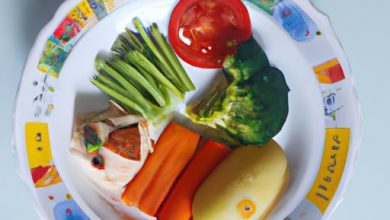What is a Diet Meal?
If you’re health-conscious or looking to lose weight, you may have heard the term “diet meal” before. But what exactly is a diet meal? A diet meal is a meal that is specifically designed with the goal of promoting weight loss, improving health, or managing a particular medical condition. These meals are typically low in calories, high in nutrients, and contain specific ratios of macronutrients such as proteins, carbohydrates, and fats.
There are many different types of diet meals, each with its own set of guidelines and nutritional requirements. Some popular examples include low-carb diet meals, plant-based diet meals, Mediterranean diet meals, and paleo diet meals. While the specific nutritional requirements of each diet meal may vary, they all share the goal of promoting overall health and wellness through healthy eating.
Low-Carb Diet Meals

A low-carb diet meal is a meal that is low in carbohydrates and high in protein and fat. The goal of a low-carb diet is to reduce the body’s insulin response and promote fat burning. Some popular low-carb diet meals include grilled chicken with vegetables, salmon with avocado, or a salad with mixed greens, nuts, and berries.
One of the main benefits of a low-carb diet is that it can help promote weight loss. When the body is in a state of ketosis, it burns fat for energy instead of carbohydrates, which can lead to significant weight loss over time. Additionally, low-carb diets have been shown to improve blood sugar control, reduce inflammation, and lower the risk of heart disease.
Benefits of Diet Meals
Following a diet meal plan can provide numerous benefits for your overall health and well-being. Here are some of the most significant benefits:
Weight Loss
One of the primary benefits of following a diet meal plan is weight loss. When you eat a healthy, balanced diet that is low in calories and high in nutrients, your body will naturally shed excess weight. This can not only help you look and feel better but can also reduce your risk of developing obesity-related health conditions such as diabetes, heart disease, and stroke.
Improved Digestion
Eating a diet that is rich in fiber, protein, and healthy fats can help to improve your digestion. These nutrients help to keep your digestive system functioning properly, promoting regular bowel movements and reducing the risk of constipation and other digestive issues.
Reduced Risk of Chronic Diseases
Following a diet meal plan can also help to reduce your risk of developing chronic diseases such as heart disease, diabetes, and cancer. This is because a healthy diet is rich in nutrients that support overall health and wellness, including antioxidants, anti-inflammatory compounds, and vitamins and minerals.
Increased Energy Levels
Finally, following a diet meal plan can help to increase your energy levels and improve your overall mood. When you eat a healthy, balanced diet, your body receives the nutrients it needs to function optimally, which can boost your energy levels and help you feel more alert and focused throughout the day.
Components of a Diet Meal
A healthy diet meal plan should include a variety of nutrient-dense foods that provide the body with the nutrients it needs to function optimally. Here are some of the key components of a healthy diet meal:
Proteins
Proteins are essential nutrients that are required for the growth, development, and repair of tissues throughout the body. Good sources of protein include lean meats, poultry, fish, eggs, beans, and legumes.
Carbohydrates
Carbohydrates are an important source of energy for the body and should be included in a healthy diet meal plan. Good sources of carbohydrates include fruits, vegetables, whole grains, and legumes.
Fats
Healthy fats are an important component of a balanced diet meal plan, as they provide the body with essential fatty acids and help to keep the body’s cells functioning properly. Good sources of healthy fats include nuts, seeds, avocados, and olive oil.
Fiber
Fiber is an essential nutrient that helps to promote healthy digestion and reduce the risk of chronic diseases. Good sources of fiber include fruits, vegetables, whole grains, and legumes.
Vitamins and Minerals
Finally, a healthy diet meal plan should include a variety of nutrient-dense foods that provide the body with the vitamins and minerals it needs to function optimally. Good sources of vitamins and minerals include fruits, vegetables, whole grains, and lean proteins.
How to Prepare a Diet Meal
Now that you know what a diet meal is and the different types of diet meals, let’s talk about how to prepare a diet meal. Here are some tips to help you create a healthy and delicious diet meal:
Choosing the Right Ingredients
When it comes to creating a diet meal, choosing the right ingredients is crucial. Opt for whole foods that are high in nutrients and low in calories, such as fruits, vegetables, lean proteins, and healthy fats. Avoid processed foods, sugary drinks, and foods high in saturated and trans fats.
Portion Control
Portion control is another essential factor to consider when preparing a diet meal. Even healthy foods can lead to weight gain if consumed in large quantities. Use measuring cups, a food scale, or visual aids such as your hand to help you determine appropriate portion sizes.
Cooking Methods
Finally, the cooking method you choose can also impact the nutritional value of your diet meal. Opt for healthy cooking methods such as grilling, baking, broiling, or steaming. Avoid frying or cooking with excessive amounts of oil, butter, or salt.
Conclusion
In conclusion, a diet meal is a meal that is specifically designed to promote overall health and wellness. There are many different types of diet meals, each with its own set of nutritional guidelines and requirements. By choosing the right ingredients, practicing portion control, and using healthy cooking methods, you can create a delicious and nutritious diet meal that supports your health goals. So why not give it a try and see how it can benefit your health? At Zahnweiss Info, we’re dedicated to providing the latest updates on health news and expert advice to help you live your healthiest life.




